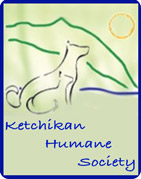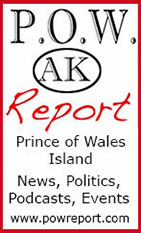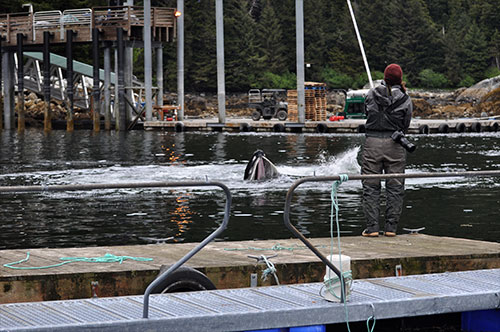



Weekly Specials
Online Shopping; Pickup or Delivery |
|












 Contact Contact 
 Webmail
Letters Webmail
Letters
 News Tips News Tips
 Copyright Info Copyright Info
 Archives Archives
Quick News
Search
 Alaska Alaska
 Ketchikan Ketchikan
 SE Alaska SE Alaska
Columns
- Articles
 Dave Kiffer Dave Kiffer
 Money Matters Money Matters
Historical
Ketchikan
 June Allen June Allen
 Dave
Kiffer Dave
Kiffer
 Louise
B. Harrington Louise
B. Harrington
Sports
 Ketchikan Links Ketchikan Links
Public Records
 FAA Accident Reports FAA Accident Reports
 NTSB
Accident Reports NTSB
Accident Reports
 Court Calendar Court Calendar
 Recent Filings & Case Dispositions Recent Filings & Case Dispositions
 Court Records Search Court Records Search
 Sex Offender Reg. Sex Offender Reg.
 Public Notices Public Notices
 Alaska Recall Alerts Alaska Recall Alerts
 Recalls.gov Recalls.gov
 AST Daily Dispatch AST Daily Dispatch
 KTN
Police Reports KTN
Police Reports
 Juneau Police Reports Juneau Police Reports
Weather,
Webcams
 Today's
Forecast Today's
Forecast
 KTN
Weather Data KTN
Weather Data
 AK
Weather Map AK
Weather Map
 AK Weathercams AK Weathercams
 AK Earthquakes AK Earthquakes

|
|

Saturday
June 15, 2019

Ms. Doe and Fawn
Sitka Black-tailed deer fawns are born in early June
and weigh 6-8 pounds at birth.
Front Page Feature Photo By SUSAN HOYT ©2019
|
|
Southeast Alaska: Senators Call for Action on Transboundary Issues By MARY KAUFFMAN - In an unprecedented and bipartisan effort, all eight U.S. senators from the four U.S. states bordering B.C. are urging British Columbia Premier John Horgan to recognize that contamination from upstream B.C. mining in shared U.S./Canada rivers threatens American businesses, citizens and resources.
The U.S. Senate delegations of Alaska, Idaho, Montana, and Washington sent a letter Thursday to Premier John Horgan of British Columbia (B.C.) urging attention and action on key issues related to transboundary mining practices. The letter, led by Senator Lisa Murkowski (R-AK), which was also signed by U.S. Senators Dan Sullivan (R-AK), Mike Crapo (R-ID), Jim Risch (R-ID), Jon Tester (D-MT), Steve Daines (R-MT), Maria Cantwell (D-WA), and Patty Murray (D-WA), encourages standards of oversight and accountability for B.C. development projects that are similar to what is required on the U.S. side of the border, and expresses a desire for continued communication and engagement.
This multi-state, bipartisan letter follows multiple letters by the Alaska Delegation to the Department of State over the last five years expressing concerns about B.C. mining practices and potential downstream effects on U.S. resources and livelihoods. The letter highlights Congress’ continued work to address these concerns and urges Premier Horgan to meaningfully engage on the issue while working towards solutions with stakeholders, affected states, and the federal governments on both sides of the U.S.-Canada border.
“This letter shows solidarity from our states and calls for greater protections for our transboundary watersheds. Reforms that ensure mining projects in British Columbia don’t impact Southeast Alaska are essential to protecting our way of life, and must include a system of financial assurances to assure sustained protections of vulnerable natural resources,” said Senator Murkowski. “It is my sincere hope that this message can inform bilateral discussions going forward, as those at the table are more aware of the interests and actions of the U.S. Congress.”
“I’ve been working for several years now with our Canadian counterparts—at the local, provincial and federal levels—to raise awareness and concern about the potential impacts posed by mining development to streams flowing across our borders into Alaska’s Southeast communities and waters,” said Senator Sullivan. “While we need to continue these discussions with our partners to the east, we also need to begin putting forward concrete steps that will ensure that all British Columbian mining projects have the level of oversight, monitoring, financial assurances, and mitigation planning necessary to protect Alaska’s world-class fishery resources in Southeast."
In their letter, the members highlighted past and current efforts to protect American interests in the face of potential environmental and economic impacts resulting from large-scale mines in B.C., including improved water quality monitoring.
“As you know, Alaska, Washington, Idaho, and Montana have tremendous natural resources that need to be protected against impacts from B.C. hardrock and coal mining activities near the headwaters of shared rivers, many of which support environmentally and economically significant salmon populations. Additionally, indigenous peoples whose lands are affected by past, present, and proposed mines near transboundary rivers have voiced concern and requested that the U.S. and Canadian governments undertake cumulative assessments of impacts to communities, cultural and natural resources, as well as the enforcement of the Boundary Waters Treaty of 1909,” the Senators wrote. “These transboundary watersheds support critical water supply, recreation opportunities, and wildlife habitat that support many livelihoods in local communities. We appreciate the diverse array of benefits that responsible management of our shared watersheds can bring, and view this as an opportunity to engage and collaborate toward a mutually beneficial future.”
Quoting a joint news release from Salmon Beyond Borders, Headwaters Montana, & National Parks Conservation Association, for decades, B.C.’s large-scale, open-pit hard rock and coal mines have polluted rivers that flow from B.C., fouling U.S. waters with acid mine drainage and other contaminants. In the Elk/Kootenai watersheds, shared by Idaho, Montana and B.C., selenium from Teck Resources’ coal mines has killed and deformed fish and threatens native trout and Kootenai River white sturgeon. In Alaska, acid mine drainage from B.C.’s Tulsequah Chief mine into the transboundary Taku River, one of the region’s most productive for salmon, has continued for more than 60 years. Compounding threats, B.C. is rapidly approving new mines and expanding existing mines in the lands around all four surrounding states’ rivers. Most recently, British Columbia opened a permit process for a controversial new mine in the headwaters of the Skagit River, which flows into Washington state through North Cascades National Park, and into the Puget Sound.
Current B.C. regulations do not require a cumulative analysis of mining impacts to these shared rivers, though the land around them, in at least one instance, is more than 50 percent covered by mining claims and leases. Furthermore, current regulations do not require consent from First Nations, private property owners, or allow for meaningful public input by U.S. stakeholders and tribal citizens.
The senators’ letter is the latest action aimed at cleaning up B.C.’s mining operations in transboundary rivers.
The Southeast Alaska Indigenous Transboundary Commission (SEITC) also commended the action taken by the eight United States Senators in their joint letter to British Columbia (BC) Premier Horgan. Quoting a SEITC news release, "We face an international problem requiring international solutions. The US and BC must work vigilantly together to protect our lands and precious watersheds."
The Southeast Alaska Indigenous Transboundary Commission said Indigenous peoples are disproportionately affected by past, present and proposed mines near transboundary rivers and have long voiced concern. Protecting our people’s future requires more than cursory assessments of impacts and business as usual. It requires enforcement of the Boundary Waters Treaty of 1909. BC already violates the Treaty by allowing the Tulsequah Chief Mine to pollute the Taku River watershed for over 60 years and counting. "We have lived on and managed these lands and waters for millennia. Our voice is critical at the decision table so that both the US and BC can collaborate toward a mutually beneficial future. We seek permanent protections from future disaster." - More...
Saturday PM - June 15, 2019
Fish Factor: Salmon dominates fishing headlines; Pebble pushback; Building blue businesses By LAINE WELCH - Salmon dominates the summer fishing headlines but it’s among many other fisheries going on throughout the Gulf of Alaska and Bering Sea.
Alaska’s salmon season has gotten off to a mixed start, with strong catches in some regions over the past month and dismal hauls in others.
Good harvests have continued at the Copper River and more recently throughout Prince William Sound. That’s not been the case at Kodiak, Cook Inlet and Chignik where fishing is off to a very slow start.
Trollers are targeting Chinook salmon in Southeast, and other salmon fisheries are popping up all over that region.
The state research vessel Pandalus is on its way to Port Moller to start sampling ahead of the big sockeye run expected in a few weeks at Bristol Bay.
State managers predict a total Alaska salmon catch this year of 213 million fish, 84 percent higher than 2018.
In other Alaska fisheries - A lingcod fishery reopened at East Yakutat on June 7 and Southeast’s shrimp beam trawl fishery reopens on July 1 with a 175,000 pound combined harvest of pink and sidestripes.
Fishing for Alaska pollock reopened on June 10 in the Bering Sea where a catch this year will top three billion pounds. Hundreds of other Bering Sea and Gulf boats also are targeting cod, flounders, rockfish, and myriad other whitefish.
Alaska halibut longliners are nearing a catch of eight million pounds out of a 17 million pound catch limit. For sablefish, about 10 million pounds has crossed the docks from a 26 million pound quota.
Several summer crab fisheries are coming online: The Dungeness season opens in Southeast Alaska on June 15. State fishery managers will use catch stats from the first seven days to predict the harvest for the season. Last summer’s dungy fishery produced three million pounds.
The Aleutian Islands golden king crab fishery also opens on June 15 for a slightly increased catch topping seven million pounds.
A red king crab fishery will open at Norton Sound on June 26 for a 147,300 pound harvest.
Finally, a wrap up by state managers shows that 19 seiners set a record at Alaska’s largest herring fishery at Togiak in April with a 23,060 ton harvest. Fishermen got just $75 a ton for the roe herring making it worth $1.73 million at the docks. - More...
Saturday PM - June 15, 2019
|
Ketchikan: Advisory for Ketchikan Beaches Issued; Enterococci bacteria may indicate a health risk - The Alaska Department of Environmental Conservation (DEC) has issued an advisory for five coastal areas in Ketchikan due to elevated levels of bacteria in recent samples of the marine water at these locations.
Water samples were collected on June 10, 2019 at 12 beaches. Five of these beaches showed elevated enterococci and fecal coliform levels. These beaches are:
- Shull Road (south of Whipple Creek)
- Refuge Cove Beach (south end of Refuge Cove Beach State Park)
- Thomas Basin (Stedman Street Bridge, mouth of Ketchikan Creek)
- Rotary Beach, also known as Bugges Beach (south of Saxman)
- Mountain Point – Cultural Foods location (near Mountain Point boat launch)
Until sample results consistently meet water quality standards and DEC lifts this advisory, people should take precautionary measures when visiting the five beaches listed above. DEC recommends beach users take normal precautions to avoid exposure, such as avoid swimming in the water, and washing after contact with the water. DEC recommends that when fishing in these areas people should rinse fish/marine foods with clean water and cook seafood to a minimum internal temperature of 145 degrees Fahrenheit to destroy pathogens.
Fecal coliform bacteria levels were also above state limits protecting consumption of raw fish and shellfish at six additional beaches: Knudson Cove, South Point Higgins Beach, Seaport Beach, Rotary Beach, Herring Cove Beach and Mountain Point Surprise Beach. A recreational advisory is not in effect for these beaches, but cleaning and cooking fish is highly recommended.
Enterococci and fecal coliform bacteria can come from any warm blooded animal, including birds, seals, and dogs, as well as humans. Potential sources of this bacteria on Ketchikan beaches may include wildlife and pet feces, human waste from private and municipal treatment systems, sewer line leakage, and/or boats in harbor areas. - More...
Saturday PM - June 15, 2019
Southeast Alaska: KOOTZNOOWOO, INC. ADVANCES ANGOON HYDROELECTRIC PROJECT - Kootznoowoo, Incorporated, the Alaska Native village corporation for the community of Angoon, recently entered into an amended grant agreement for the Thayer Creek Hydropower Development Transmission Project. According to Kootznoowoo Board Chair Melissa Kookesh, the hydropower project has been in development for over three decades.
The project recently received the green light to move forward with the completion of the project’s design, thanks to increased funding through an amendment to the previous grant provided by the Alaska Energy Authority (AEA). Board Chair Kookesh and AEA Executive Director Curtis Thayer recently signed the amendment which increased the funding by nearly $1 million. This grant, when added to a $100,000.00 contribution from the Inside Passage Electric Cooperative, will provide the total funding necessary to bring the project to a shovel-ready construction threshold in early 2021.
“This grant is a significant and positive step forward for Thayer Creek and the community of Angoon,” said Kookesh. “One of the biggest challenges when working to secure construction funding is the unknown costs of the project. This funding will allow the project to move from 35% to 100% completion of the design phase so the final project costs can be better defined.” - More...
Saturday PM - June 15, 2019
Alaska: NOAA Fisheries Responding to Multiple Dead Ice Seals in Bering Sea Region - NOAA Fisheries is responding to several reports of unusually large numbers of dead ice seals along the coast of the Bering and Chukchi seas, in Alaska. At least 60 dead seals have been reported.
NOAA Fisheries received multiple reports Monday (June 10) of dead ice seals (bearded, ringed, and spotted seals) in southwest Norton Sound. A hunter from Kotlik counted 18 seal carcasses along 11 miles of shore, north of Kotlik. This same hunter reported dozens of ice seals along the shores of Stuart Island, north of Stebbins. A biologist with the National Park Service reported six dead seals between Kotzebue Airport and Sadie Creek, as well as accounts from the public of up to 30 dead seals between Kivalina and Point Hope. We are working with our Alaska Marine Mammal Stranding Partners to document (photograph) and conduct necropsies on as many of these animals as possible.
The carcasses of eight young bearded seals were also found May 10 near Gambell, on St. Lawrence Island in the northern Bering Sea.
Hair loss has been reported for some dead ice seals. Further examination of fresh animals will help determine if this is due to decomposition or if it could be abnormal molting, similar to symptoms present in ice seals during the 2011-2016 Unusual Mortality Event involving seals and walruses in the Bering and Chukchi seas.
As ice seals are an essential resource for Alaska Native communities, food safety is a major concern. Some people have expressed concerns about contamination. Others have reported the seals are unusually thin this year, and are worried about prey availability. NOAA is working to respond to concerns from the Bering Sea Elders Group, Kawerak Inc., Association of Village Council Presidents, and individual hunters/fishermen. - More...
Saturday PM - June 15, 2019 |
|
Alaska: Governor Dunleavy Calls 2nd Special Session in Wasilla to Complete Work on Permanent Fund Dividend By MARY KAUFFMAN - Following a legislative gridlock on the Permanent Fund Dividend throughout a 121-day regular session and month-long special session, Governor Michael J. Dunleavy on Thursday issued a proclamation calling the Alaska Legislature into special session to provide for a full PFD as outlined in Alaska statute. The special session proclamation calls lawmakers into session in Wasilla beginning July 8, 2019.
“While the legislature has avoided a no budget scenario, their work is not finished until they provide Alaskans with a full PFD outlined by statute. Today [Thursday] I am calling a second special session in Wasilla so lawmakers can complete their work and follow the law,”said Governor Dunleavy. “At this point, a change in venue is necessary to refocus the conversation and remind lawmakers about the people and their PFD. Once the issue of the PFD is solved, these other budgetary issues will fall into place quickly.”
"The Governor’s statement today [Thursday] is disappointing. It’s ironic for Governor Mike Dunleavy to talk about following the law when he has blatantly ignored or trampled on it in terms of appointment of judges, funding education, and using public funds for his own political purposes. Rather than casting blame, perhaps he should take a little time to reach out to others and build consensus that moves Alaska forward, not just his own personal agenda," wrote Sen. Tom Begich (D-Anchorage) in a prepared statement.
The First Special Session ended this week with the Legislature passing a capital budget (although without funding sources) or any answers on the Permanent Fund Dividend, or K-12 education funding for FY 2020.
Thursday, the Dunleavy administration also released $20 million in school funding that was approved by the Legislature more than a year ago. The Legislature last year fully funded Alaska schools for two years, and set aside $20 million for the school year that just ended and another $30 million for the budget year about to begin. Quoting an Alaska House Majority news release, the House and Senate have voted to allow the Joint Legislative Council Committee to sue the administration if it continues to withhold the funds.
“This is a good first step,” said Senator Gary Stevens (R-Kodiak) chairman of the Senate Education Committee. “I sincerely appreciate the governor’s decision to distribute these funds. It’s my hope that we reach quick resolution on the bulk of K-12 education funding for next year, sparing parents, educators and students from further uncertainty.”
“If the state doesn’t transfer funds to public schools in July, we will ask the court to issue an injunction and allow state funding for schools to continue while the issue is being litigated,” Sen. Stevens added.
Governor Dunleavy called on the Legislature in early May to avoid a precedent-setting constitutional standoff by funding education in the FY2020 budget, which he “will not veto… in any form or fashion.”
According to Governor Dunleavy, both the Alaska House and Senate FY2020 budget’s failed to include funding for education, a position based on the belief that future funding of education was made during the Second Session of the Thirtieth Legislature. However, the 2018 future funding provision failed to include actual dollars and clearly attempted to bind the hands of a future legislature and governor. According to an April 9, 2019 review by the Alaska Attorney General, that action violates the Alaska Constitution’s prohibition against dedicating future revenues and providing for an annual budget where the legislature and the governor can considering annual funding priorities.
During the special session, the Legislature passed an operating budget cutting spending to the lowest level in 15 years while also keeping the State of Alaska on track to avoid a government shutdown when the new fiscal year begins July 1, 2019. If the governor accepts and signs the operating budget, Alaskans will have certainty that the essential services they rely on will continue uninterrupted.- More...
Saturday PM - June 15, 2019 |
Alaska: Big whales eat tiny fish at hatchery buffets By LAUREN FRISCH - At the Hidden Falls Hatchery in Chatham Strait, three whales have tapped into a yearly all-you-can-eat buffet. The whales have learned that the hatchery releases juvenile salmon in the same place each summer, providing a reliable snack for the roaming predators.
Researchers at the University of Alaska Fairbanks College of Fisheries and Ocean Sciences and the University of Alaska Southeast have spent nine years studying the impact of this predation on hatchery fish. Now, CFOS graduate student Madison Kosma wants to understand how the predation contributes to each whale’s diet.
“Our goal was to go out before, during and after releases to get tissue samples from these individual whales to see what proportion of each whale’s diet is made up of hatchery salmon during the spring and early summer,” Kosma said. “This is important because it will help us determine how much these animals rely on hatchery fish, which could key us in to the potential impact they are having on the hatchery returns.”
Kosma is using stable isotopes in whale skin to identify and track hatchery fish in each whale’s diet. Isotopes refer to the number of neutrons carried by an element such as carbon or nitrogen. As reflected in the saying “you are what you eat,” plants and animals each have a unique balance of isotopes, called an isotopic signature, based on what they eat and the environment they live in. Studying the ratio of different isotopes in a predator’s skin and body can help reveal what that animal ate. When a humpback whale in Chatham Strait eats different kinds of fish, its isotopic signature reflects the individual signatures from all of those prey fish.
Fish released from hatcheries have a unique isotopic signature because they are fed wheat products, an ingredient not found in wild fish diets. That makes the fish easy to identify in diet-related analyses.
So how do the researchers collect whale skin samples? “We use a crossbow,” Kosma said. The crossbow launches a modified arrow that contains a yellow float (so they don’t sink underwater) and a hollowed-out tip for collecting tissue samples. When the bolt launched from the crossbow hits a whale, it removes a small plug of skin and blubber, bounces off and floats in the water where it can be easily retrieved. - More...
Saturday PM - June 15, 2019
Alaska: Monitoring a mystery bird in Yakutat By NED ROZELL - On sandy barrier islands between mountains and the sea, two different birds that look alike lay their eggs side by side. Biologists here are learning more about the less common, more mysterious one.
Arctic terns and Aleutian terns gather together on ocean spits to scratch out nest cups. Each is a graceful creature that distinguishes itself from a gull by the incessant slicing of its sharp wings through the air. Arctics, loud and quick to dart at any creature that walks near a nest, have pure black heads and pumpkin-orange beaks. Aleutians, more subdued, have white eyebrow patches and black beaks.
There are more than 1 million pairs of Arctic terns worldwide, but many fewer Aleutian terns.
“There’s a small global population — about 30,000 birds breeding here and in Russia,” said Susan Oehlers, a Tongass National Forest biologist based in Yakutat. “They are probably declining, but we have very little information on them.”
Numbers of Aleutian terns at Alaska colonies have declined by 8 percent every year since 1960, biologist Heather Renner of the Alaska Maritime National Wildlife Refuge and other scientists wrote in a 2015 paper. In Alaska, Aleutian terns nest along sandy stretches of coast from Yakutat all the way up to the Bering Sea. Many more Aleutian terns breed along the coast in eastern Russia.
Researchers here in Yakutat, where residents just hosted a tern festival, are joining with others to unravel the mysteries of the Aleutian tern.
Oehlers and her colleagues have learned a lot about the birds in recent years. Using geolocator tags and satellite transmitters attached to breeding Aleutian terns, they have found where the birds have gone once they leave Alaska for the winter. Not long ago, no one knew.
Arctic terns fly almost the circumference of the Earth each year to spend summers in the far North and winters in Antarctica. Aleutian terns go almost as far another way. - More...
Saturday PM - June 15, 2019 |
JEFF LUND: Remembering Dad - Ten Father’s Days ago, my brother poured Dad’s ashes into a creek.
In the weeks after, I could only remember the end. I tried to stay at better memories, but they all evaporated into serious doctors, my ailing father and finally, the end.
The next time I saw my buddy Nate, he put his hand on my shoulder, nodded his head and said, “Hey…ok?”
What he meant was, “If you need anything, let us know,” but it was communicated through a head nod and just two words.
I really don’t remember if I took him up on it. That’s not to say I grieved alone, I felt the support and love coming from Klawock, Manteca (CA) and the college buddies, but I just didn’t really know what to say. I did write which helped, especially through the weird numb phase when life tastes like stale crackers. You keep trying, hoping the taste will come back but it doesn’t. They used to be good, you used to love them, now you’re eating out of obligation not to waste the box. - More...
Saturday PM - June 15, 2019
 |
TOM PURCELL: My Remarkably 'Unremarkable' Father - My dad turns 86 next month. He never thought he'd live so long - or see as many Father's Days as he has - because his parents both died far too young.
A stroke claimed his mother when she was 69 - the same night Pittsburgh Pirates great Roberto Clemente's hurricane-relief plane went missing.
It was the first time I'd ever heard my father sob.
My dad's father was only 34 when he died in 1937. My father, then just 3, lost half of his universe. His dad had a great job as an accountant for the Mellon family. His early death greatly altered my father's future.
My dad's mother had to work full-time to make ends meet, leaving him to fend for himself on city streets.
Often unsupervised, he got into some trouble - once, a stone he set on the tracks nearly derailed a trolley car - but sports saved him.
His high school football coach shaped him into a championship running back - while serving as the father figure he ached for.
And then, after a baseball game he'd played, my father met my mother.
When their eyes met on that afternoon 68 years ago, it was lights out for him. - More...
Saturday PM - June 15, 2019
|

Political Cartoon: Father's Day - June 16, 2019
By Milt Priggee ©2019, Oak Harbor, WA
Distributed to paid subscribers for publication by Cagle Cartoons, Inc. |
 |
Our Alaskan Elders Deserve the Best Affordable Quality Care Available, Let’s Honor Them Together By
Jordan Adams - Alaska enjoys a deep-rooted history of honoring our elders. The state administration is proposing rate hikes for Pioneer Homes residents, making them a profit center would be disrespectful. At the same time - it wants to obliviously outsource jobs at the Pioneer Homes without an appropriate study to find potential hidden costs. Local 71 is proud to represent the deeply committed, hard-working people who provide food and custodial services to the residents of our Alaska Pioneer Homes. I am regularly reminded that these working people are highly valued by the residents, their families, the health care staff, and those serving on the Advisory Committees and Foundation Boards. We support our Pioneers together. But turning our elders into a profit center - that’s just not Alaskan.
That’s because the working people of Local 71 care about the quality of the services they provide and subscribe to the EDEN Home philosophy of care, which is committed to “eliminating loneliness, uselessness, and boredom; and valuing community, empowerment, passion and integrity,” which enhances the overall health and wellbeing of Alaska’s Pioneer Home Residents according to the medical community. The respect and compassion our Local 71 members bring to these great Alaskans is unsurpassed and is widely recognized by our Pioneer Home residents, their families, Advisory Committees, Foundation Boards, vendors, and communities at large. Our members average over 10 years serving our elders, and many have served in their positions for over 20 years. Outsourcing their jobs would punish these public servants for their perfect record. That would be a mistake. - More...
Tuesday AM - June 11. 2019
 |
“EVERYTHING BUT THE SPLINTERS” By David G Hanger - The local Wal-Mart has stopped carrying Kleenex brand nose tissues, apparently in favor of its own preferred generic brand. Reminds me of an old saw I was told about my grandparents one day back in the 1930s when my grandfather brought home from the store a substitute type of toilet paper, “Northern Pine.” Next morning, so the story goes, Grandma came a mumbling and a grumbling down the stairs, “Northern Pine. Northern Pine. Everything but the splinters.”
I can’t really say that “Great Value,” Wal-Mart’s store brand, is going to lead to a chapped nose faster come a cold than Kleenex; haven’t done that test yet; so for the moment that is just an assumption, but while one could submit that it is not polite to force buying choices on your customers, I would simply observe that the preferred brand is available elsewhere, and for a box of Kleenex sending your customers to someone else’s store is rather stupid.
When in addition, as I assessed about three months ago, the prices for the items I routinely buy have already gone up 9% or more, and this before your threatened increases because of Trump’s tariffs, and you are apparently incapable of keeping your shelves stocked, I do have to wonder if you give even a tinker’s damned about your customers. (Inflation has increased under Trump from the 1.9% average for all the years of the Obama administration to just short of 2.2%, in other words a trifle, so how you begin to get 9% and counting out of that is curious.) - More...
Tuesday AM - June 11, 2019
White House Staff Out Of Control By
Donald Moskowitz - A White House staffer, who works for President Trump, sent a message to the Navy in the Pacific to " minimize the visibility of the USS John S. McCain " during Trump's visit to Japan. This constitutes interference in naval operations.
The USS John S. McCain's crew was not invited to events on the USS Wasp, at one point a tarp was seen obscuring the USS John S. McCain's name, and at another point a barge blocked the name of the ship.
The ship was originally named after Senator McCain's father and grandfather, both past admirals in the U.S. Navy. I am sure crew members are proud of their ship, but have to be dismayed at the request from the White House, and Trump's constant criticism of the late Senator McCain. - More...
Tuesday AM - June 11, 2019
 |
Constitutionalize the Dividend By
Sen. Tom Begich - As this week comes to a close, the legislature has yet to finish its work on the budget and the State is nearing a possible government shutdown. What’s the holdup? While there are many issues including the Governor’s unconstitutional claim that he can simply not fund education, the issue that has tied up the legislature and left us in a stalemate at present comes down to a question of the size of the Permanent Fund Dividend. Should it meet the Statutory Formula (currently around $3,000)? Should it be reduced so that we can break the impasse on the Operating Budget and ensure that needed state services are not interrupted? Should we develop a new formula and pay a full Dividend this year? All of these are valid questions with strong constituencies. The answer lies in a place that will likely leave no one fully happy. - More...
Friday AM - June 07, 2019
 |
Crime Bill Passes the Legislature By
Rep. Dan Ortiz - Earlier this month, the House passed House Bill 49, which is a collaborative bill between the House, the Senate, and the Governor's administration to improve public safety. After the Conference Committee process last week, the Senate passed the bill on Tuesday, May 28th. The bill now heads to the Governor’s Office to be signed. The bill has most generally been referred to as the “SB91 Repeal” and contains the following provisions:. - More...
Saturday AM - June 01, 2019
 |
Local Tourism Growth By
Austin Otos - Welcome to the beginning of the 2019 tourist season! This year our community is expected to reach 1.2 million visitors. I was excited to see entrepreneurs start up new local businesses ranging from delicious eateries to adventurous sightseeing tours. These important businesses make up the backbone of our tourist economy and provide excellent service to eager visitors willing to come see our awesome town! Many people see tourism as a healthier and more stable economy than past resource extraction. However, I sense a growing division within the community between “restrictionist” and “expansionist”. The common themes I hear from restrictionists are capping visitors and playing hardball with the cruise ship industry over dock improvements. On the other side, I find expansionists looking to take visitors beyond Ketchikan, working around zoning laws. These two forces have brought up issues over infrastructure such as road and sidewalk improvements, growing the outlying Clam and Herring Cove areas, and the private-public dock partnership. - More...
Saturday AM - June 01, 2019
 |
Refusing to release education funds is harming our schools and children By Sarah Sledge; Dr. Lisa Skiles Parady; Norm Wooten - We’re perplexed. And disappointed. Gov. Mike Dunleavy was an educator and claims to serve all Alaskans but has decided that education funding will not be released to school districts on July 15 this year. Talk about a harsh disconnect! - More...
Saturday AM - June 01, 2019
Email letters, opinions, OPEDs to editor@sitnews.us
|
Articles &
photographs that appear in SitNews may be protected by copyright
and may not be reprinted or redistributed without written permission
from and payment of required fees to the proper sources.
E-mail your news &
photos to editor@sitnews.us
Photographers choosing to submit photographs for publication to SitNews are in doing so, granting their permission for publication and for archiving. SitNews does not sell photographs. All requests for purchasing a photograph will be emailed to the photographer.
|
|
















The Local Paper is
available online.
Click here for this week's printed edition (PDF)


|
|

![]() Contact
Contact ![]()
![]() Webmail
Letters
Webmail
Letters![]()
![]() News Tips
News Tips![]()
![]() Copyright Info
Copyright Info![]() Archives
Archives![]() Alaska
Alaska![]() Ketchikan
Ketchikan![]() SE Alaska
SE Alaska![]() Dave Kiffer
Dave Kiffer![]() Money Matters
Money Matters ![]() June Allen
June Allen![]() Dave
Kiffer
Dave
Kiffer![]() Louise
B. Harrington
Louise
B. Harrington ![]() Ketchikan Links
Ketchikan Links![]() FAA Accident Reports
FAA Accident Reports ![]() NTSB
Accident Reports
NTSB
Accident Reports![]() Court Calendar
Court Calendar![]() Recent Filings & Case Dispositions
Recent Filings & Case Dispositions ![]() Court Records Search
Court Records Search![]() Sex Offender Reg.
Sex Offender Reg.![]() Public Notices
Public Notices![]() Alaska Recall Alerts
Alaska Recall Alerts![]() Recalls.gov
Recalls.gov![]() AST Daily Dispatch
AST Daily Dispatch![]() KTN
Police Reports
KTN
Police Reports![]() Juneau Police Reports
Juneau Police Reports ![]() Today's
Forecast
Today's
Forecast![]() KTN
Weather Data
KTN
Weather Data![]() AK
Weather Map
AK
Weather Map![]() AK Weathercams
AK Weathercams![]() AK Earthquakes
AK Earthquakes






































